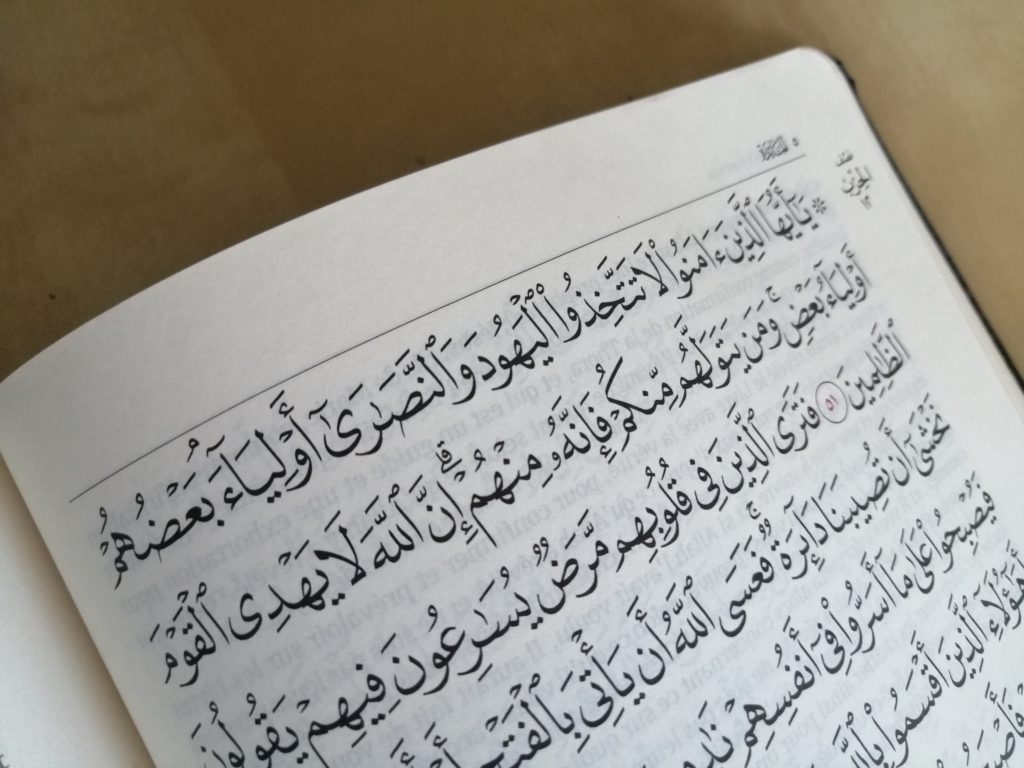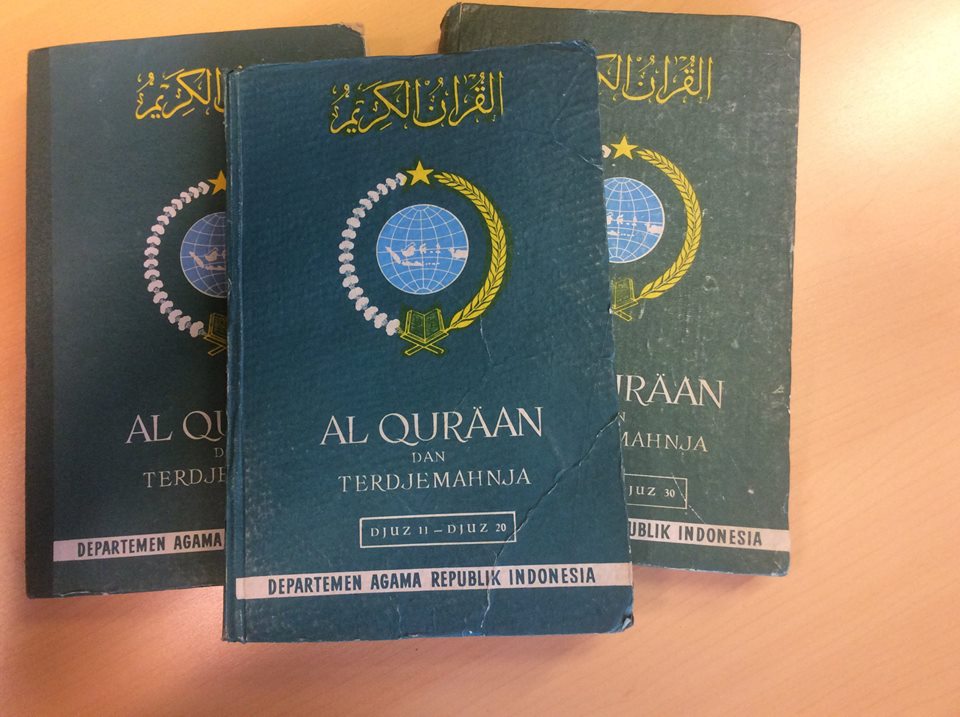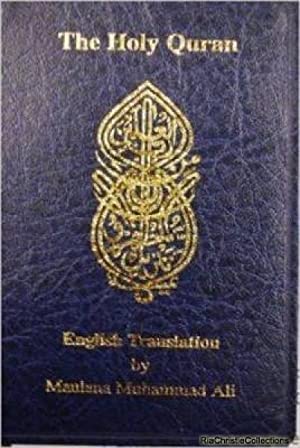In celebration of the one-year anniversary of ‘Qur’an Translation of the Week’, the GloQur team today jointly looks at modern translations of a contested verse. We will discuss Q 5:51, a verse that pertains to the relations between Muslims, on the one hand, and Christians and Jews, on the other hand. How is it rendered in modern Qur’an translations in different languages, and what are the implications?
The verse reads as follows:
يَا أَيُّهَا الَّذِينَ آمَنُوا لَا تَتَّخِذُوا الْيَهُودَ وَالنَّصَارَىٰ أَوْلِيَاءَ بَعْضُهُمْ أَوْلِيَاءُ بَعْضٍ وَمَن يَتَوَلَّهُم مِّنكُمْ فَإِنَّهُ مِنْهُمْ إِنَّ اللَّهَ لَا يَهْدِي الْقَوْمَ الظَّالِمِينَ
which could be translated in English as:
You who believe, do not take the Jews and Christians as awliyāʾ (pl. of walī). They are awliyāʾ to each other. Anyone who takes them as a walī becomes one of them. God does not guide the wrongdoers.
The key question that arises when interpreting this verse and discussing its application to the life of contemporary Muslims is, of course, the meaning of the Arabic term walī.Depending on the answer to this question, the verse could be understood – and is, in fact understood – to mean many different things, including a prohibition on having non-Muslim friends, an interdiction against voting for non-Muslim candidates in elections, a statement on the permissibility of alliances between states, or a much more limited ruling against relying on the support of non-Muslims during specific types of war, possibly in a particular historical context.
The ambiguity and divergence that can be found in modern translators’ choices is partly made possible by fact that there is no clear and complete equivalent to the term walī, in its qur’anic sense, in their target languages. But it also reflects the multitude of interpretative choices provided by the exegetical tradition. Most Qur’an translations are directly or indirectly informed by works of tafsīr (Qur’an commentaries), from early works written centuries ago to modern tafsīrs. While that connection is far from direct and uniform, an understanding of the breadth which already existed in the commentarial tradition is helpful to understand the choices made by later translators.
Q 5:51 in Arabic tafsīr
Most Qur’an commentaries contain extensive explanations of Q 5:51. As the key translation problem in the verse is the meaning of awliyāʾ, we will focus here on the Arabic words provided as a gloss for that term, wherever an exegete has provided such glosses in the case of this particular verse.
The two words mentioned by al-Ṭabarī (d. 310/923) in explaining the word walī have appeared in many other works: anṣār (‘supporters’) and ḥulafāʾ (‘allies’). Similarly, walī has been explained as a muʿīn (‘helper’), e.g. by al-Māturīdī (d. 333/944), who provides two additional interpretations: that it means ‘do not adopt their religion’ and that it extends to ‘worldly and financial matters.’ Al-Jaṣṣāṣ (d. 370/981) states that wilāya is the opposite of enmity, and that it should be avoided both in terms of support and taṣarruf, by which he may mean ‘authority of unbelievers over believers’. Al-Māwardī (d. 450/1058) states that the two opinions concerning this wilāya is that it relates to ʿahd (‘treaty’) or to dīn (‘religion’). Al-Qushayrī (d. 465/1072) reads the verse as forbidding ‘joining them [the Jews and Christians] and being considered one of them.’
Another set of interpretations implies that taking Jews and Christians as awliyāʾ involves somedegree of emotional proximity. They seem to apply the verse to situations in which Muslims and non-Muslims share the same social space, possibly reflecting the development of communal relations in the Muslim world. Here, the wording of al-Zamakhsharī (d. 538/1144) has proven influential: ‘mutual support, fraternal relations, and living with them [the Jews and Christians] as though they were believers.’ Ibn ʿAṭiyya (d. 542/1147) expresses the same concept in terms of ‘support, as well as mixing which leads to bonding and mutual backing.’ Al-Ṭabrisī (d. 548/1153) and al-Rāzī (d. 606/1210) both interpret the verse as meaning ‘do not depend on seeking their support, while treating them with affection (tawaddud).’ Al-Bayḍāwī (d. 685/1286) adapted al-Zamakhsharī’s wording to forbid ‘living with them as though they were beloved people (aḥbāb)’; while Ibn Juzayy (d. 741/1340) included ‘loving’ in the meaning, but excluded basic interactions like buying and selling; and al-Biqāʿī (d. 885/1480) used the term qarīb (‘close friend’, or ‘relative’) to describe the kind of relationship to be avoided.
As we approach the modern period, al-Shawkānī (1760–1834), following the trend noted in the previous paragraph, interprets walī with the terms muṣādaqa (‘friendship’), muʿāshara (‘living together’) and munāṣara (‘mutual support’). Rashīd Riḍā (1860–1935), in contrast, criticises this expansion of the meaning, which he attributes to people following al-Bayḍāwī; in his view, the verse is merely about mutual support and alliance (tanāṣur wa-muḥālafa). The same view is taken by Sayyid Quṭb (1906–1966), who specifically excludes the idea that the verse pertains to following the Jews and Christians in their religion (because that is not a realistic fear to have for Muslims). Ibn ʿĀshūr (1879–1973) and al-Ṭabāṭabāʾī (1902–1981), however, retain the sense of walī as denoting affection as well as support for Jews and Christians. Abū Zahra (1898–1974) discusses various senses of the word wilāya and provides another term here: intimāʾ (‘belonging’). Saʿīd Ḥawwā (1935–1989) of the Syrian Muslim Brotherhood provides a typical gloss but brings up the term walāʾ – which evokes modern Salafi discourse around al-walāʾ wa-l-barāʾ (exclusive loyalty to believers and severing of ties with unbelievers). Finally, we can mention two state-backed commentaries which were intended to standardise translation projects: the Egyptian Muntakhab, which has nuṣarāʾ (‘supporters’); and the Saudi Muyassar, which has ḥulafāʾ wa-anṣār (‘allies and supporters’), taking us back to al-Ṭabarī.
Politicization in colonial and contemporary Muslim-majority contexts
Following the interpretation as ‘helpers’ and ‘allies’ that is proposed by the Muntakhab and Muyassar, as many translators do, makes it unlikely that the verse will be read as a statement on daily life and interpersonal relations. It rather connects the verse with issues of political allegiance or military alliances, as can be seen in the rhetoric of Osama Bin Laden who used the verse to blame the Saudi and Pakistani governments for their willingness to accept military support from the United States.
In the modern history of Indonesia, the verse has taken on an equally political yet entirely different connotation. Projects to translate the Qur’an into the Malay language, which later became the official language of the Republic of Indonesia, began in the 1920s when the country was under Dutch colonial rule. That fact is directly reflected in some of the translations produced in that period, such as the annotated translation of A. Hassan (1887–1958), a prominent reformist scholar and activist, whose Al-Furqān was published in consecutive volumes between 1928 and 1956. He rendered the term awliyāʾ in Q 5:51 as ‘leaders’ (‘pemimpin’). The Qur’an commentary by the famous reformist intellectual Hamka (1908–1981) which was written in the 1960s, follows that interpretation and comments on it in a way that sheds light on the possible reasons for this particular choice. Hamka describes how colonized peoples tend to adopt a reverent attitude towards their colonial rulers, to the extent that they strive to emulate the colonizers, and hold their own religion in disdain. He mentions as an example a native collaborator from Aceh who supported the Dutch against his own people. It is in this context, he argues, that Q 5:51 forbids Muslims to take non-Muslims as leaders. According to his interpretation, the verse does not, however, prohibit good relations between independent, self-confident nations nor does it warn against having cordial relations with non-Muslim neighbours.
As Hamka’s interpretation illustrates, the understanding of awliyāʾ as leaders carried on well into the period of independence and is still pervasive in Indonesia today, bolstered by the fact it has been adopted in the official Qur’an translation published by the Indonesian Ministry of Religion since the 1960s. Even though the Ministry changed its take on Q 5:51 in the 2000s, the older versions of the translation are still ubiquitous and caused a major political controversy when a Christian ran for the office of Governor of Jakarta in 2016. The extent to which Q 5:51 has been politicized in the contemporary Indonesian context, long after the end of colonial rule, led to him losing the election and being sentenced to imprisonment following a blasphemy trial.
Muslims in Europe
In a minority context, the issue of non-Muslim political leadership is far less relevant than, for example, that of social interaction with non-Muslims, which is basically unavoidable. Moreover, unlike Indonesian Qur’an translations, translations into the language of the non-Muslim majority are often written with the gaze of the non-Muslim reader in mind, since some possible translations might be fraught with the potential of painting a negative image of Islam.
This is already apparent in one of the first English Qur’an translations written by a Muslim, and the first that became popular in Europe. In his The Holy Qur’an, published in 1917, Muhammad Ali (1874–1951), the leader of the Lahore branch of the Ahmadiyya movement, rendered the first part of Q 5:51 as follows: ‘O you who believe! Do not take the Jews and the Christians for friends.’
He recognized that using this translation of the verse without further comment could cause confusion, especially among Muslims and Muslim converts in Europe who had Jewish and Christian friends. For that reason, he added an explanatory note that clarifies how he thought the verse should be understood. He commented that this injunction refers to the time when Muslims were at war with idolaters who were allied with Jews and Christians. Since they shared a common cause against Islam and posed a threat to Muslims in general, the Qurʾan forbade believers to take Jews and Christian as friends under these particular circumstances. According to Muhammad Ali, the same principle is also used by ‘civilized nations’ today. Ali writes, ‘When two nations are at war, an individual of one nation having friendly relations with the enemy nation is treated as an enemy.’ The equation of interreligious relations during the lifetime of the Prophet Muhammad with concepts of national allegiance and high treason in modern times is a common topos in modernist qur’anic interpretation, clearly limiting the applicability of Q 5:51 to situations of war.
Despite Muhammad Ali’s extensive commentary in his footnote, on the level of translation rendering awliyāʾ as ‘friends’ may be a source of confusion for Muslims in the diaspora who might wonder – and do, indeed, sometimes wonder – whether the Qur’an allows them to be friends with their classmates, co-workers and neighbors. For the well-known Tatar preacher Shamil Alyautdinov from Russia, this topic is of great concern, in light of the multireligious context of modern Russia.
In Alyautdinov’s translation, he adopts an evasive strategy that might be called ‘zero-translation’, meaning that he does not render the word awliyāʾ into Russian but leaves it as it is, as an Arabic loan word. This is not uncommon among contemporary Qur’an translators. However, the unwillingness to make a choice in the target language does not mean that Alyautdinov avoids delivering an explanation of the meaning of the term. Referring to other verses with related meanings, he provides a clarificatory excursus in the form of an essay that is entitled ‘Who You Should Be Friends With.’ In this, Alyautdinov describes the great value of friendship and how rare it is today. He asserts that it is a huge and ‘socially harmful’ mistake to translate awliyāʾ as ‘friends’ because the semantic equivalent of ‘friends’ in Arabic is aṣdiqāʾ, whereas awliyāʾ means people who are metaphysically close to each other to the utmost extent, as if their souls have merged. In such a case, people would sacrifice themselves for each other, which might even lead to the sacrifice of their faith and beliefs. For this reason, Alyautdinov believes, Christians and Jews cannot be awliyāʾ to Muslims. However, mere friendship with people of different religions and cultures should not be seen as an obstacle because Q 5:51 does not pertain to it. This kind of explanatory maneuvering in his translation helps Alyautdinov to stay ‘faithful’ to the source text and at the same time enrich his work with extensive explanations that are contextually suitable for a modern Russian readership.
Other translations into European languages avoid the notion of friendship altogether and instead opt for alternative meanings that are part of the Muslim exegetical tradition. For example, Sofyan Sauri Siregar and his team of Indonesian diaspora Muslims in the Netherlands have translated awliyāʾ into Dutch as ‘beschermers,’ which means ‘protectors.’ They decided not to follow previous non-Muslim translators such as Keyzer (1860), who had rendered the term as ‘vrienden’ (‘friends’), or Leemhuis (1989) who had rendered it as ‘medestanders’ (‘allies’). According to Hamdi Rofiuddin, a member of the team, ‘beschermers’ are individuals or institutions who are able and willing to offer protection and guarantee the safety of a Muslim’s life. They are by definition in possession of ‘macht’ (‘power’). The concept is ‘more extreme and harder (lebih ekstrem dan lebih keras) than that of leaders, since leaders only lead while protectors include leaders, and also wider than that of friends, since it designates a place to ask for protection in relation to the safety of life.’ After a difficult debate, having consulted Qur’an translations of different languages as well as authoritative works of tafsīr, in addition to considering the social and cultural context of Muslims as a minority in Dutch society, the members of the team finally agreed on the term ‘beschermers’ by conceptualizing their choice as ‘language ijtihād’ (ijtihad bahasa).
Another option which defuses the implications of Q 5:51 is to historicize the verse, limiting its applicability to a specific situation of aggression that the early Muslim community was exposed to. This strategy is pursued in Il Noble Corano by Hamza Roberto Piccardo, a translation that plays an important role for the Islamic community in Italy since it is the first complete Muslim translation of the Qur’an from Arabic into Italian. It was first published in 1994, followed by a revised edition in 1996. Around fifteen years later, the King Fahd Qur’an Printing Complex published its own edition of this translation (2010/2011), and the Turkish Directorate of Religious Affairs followed suit in 2015.
Q 5:51 is rendered in all versions of this translation in the same way: ‘O voi che credete, non sceglietevi per alleati i giudei e i nazareni, sono alleati gli uni degli altri. E chi li sceglie come alleati è uno di loro. In verità Allah non guida un popolo di ingiusti’ (‘O you who believe, do not choose the Jews and the Nazarenes as allies, they are allies of each other. And whoever chooses them as allies is one of them. Verily, Allah does not guide a people of injustice’). The edition by the Turkish Directorate of Religious Affairs provides additional commentary that explains this verse in the context of the ‘hostility’ (‘l’ostilità’) shown by the Jews from Medina towards Muslims.
In an unusual move for Qur’an translations, Piccardo renders naṣārā as ‘Nazarenes’ instead of the far more common ‘Cristiani’/ ‘Christians,’ which gives readers the impression that the verse here refers to an ancient religious group that is not necessarily related to present-day Christians. The use of the term ‘alleati’ (‘allies’) for the translation of awliyāʾ accords to the strategy used by other translators of limiting the meaning of the verse to the description of historical events.
Translation as interpretation – translation as guidance
The case of Q 5:51 provides a good example of how extensive the range of meanings from which translators may choose can be, resulting in a wide divergence between different Qur’an translations. Translators’ choices are shaped by their target language, the options provided in the tafsīr tradition (which is itself an ongoing project), the translators’ social, religious, and political context, their training, and their individual preferences and attitudes. A Jihadi Salafi from Pakistan is bound to have a different perspective on this verse than a British Muslim who is engaged in interreligious dialogue. Consequently, a Muslim who does not know Arabic will only be able to approach the full range of meanings through translation by reading and comparing a number of Qur’an translations. Translation is a form of interpretation that, unlike the Qur’an commentaries mentioned at the beginning of this piece, severely narrows down the range of possible meanings.
How translators choose to deal with this fact is another question altogether. They might choose to be explicit about it and point out the limits of their translation, and/or they might try to mitigate the limitations of the genre by discussing select exegetical problems in footnotes. Not all translations do this, however, and it is also not always what readers are looking for. Ultimately, some translations might end up in a position of authority, being understood by their readers as consituting an unambiguous source of guidance that might ask them to refrain from taking Jews and Christians as their awliyāʾ, friends, leaders, allies, helpers, or protectors – or, alternatively, might historicize the verse in a way that makes it irrelevant to contemporary Muslims for all intents and purposes.
By the GloQur team (in order of contributions: Johanna Pink, Sohaib Saeed, Kamran Khan, Elvira Kulieva, Yulianingsih Riswan, Mykhaylo Yakubovych)









